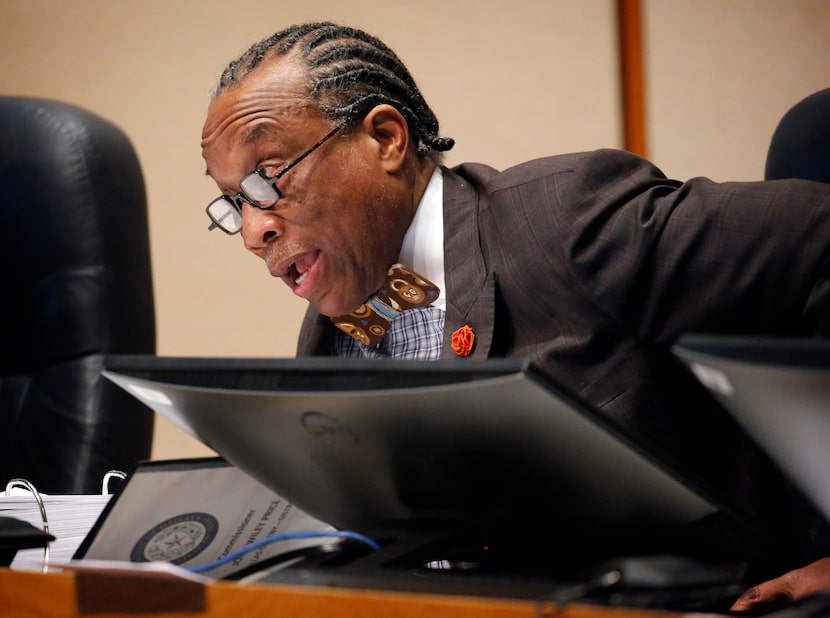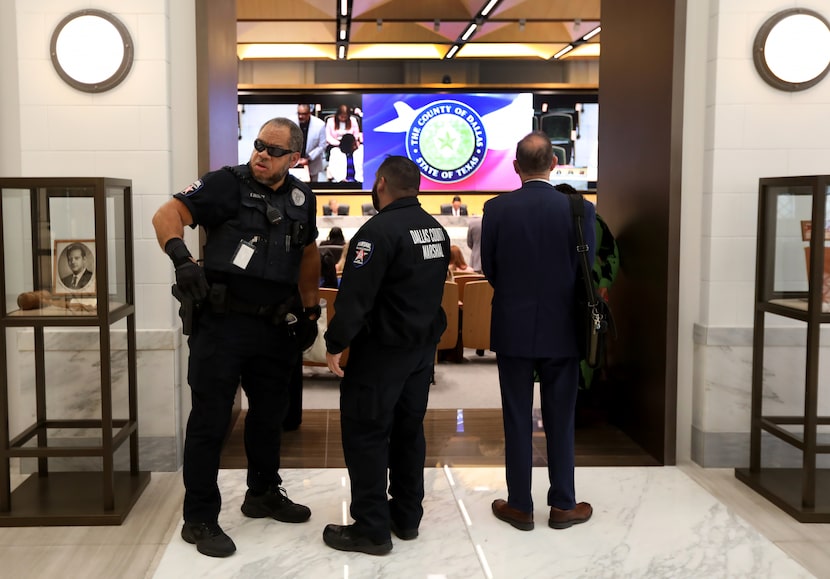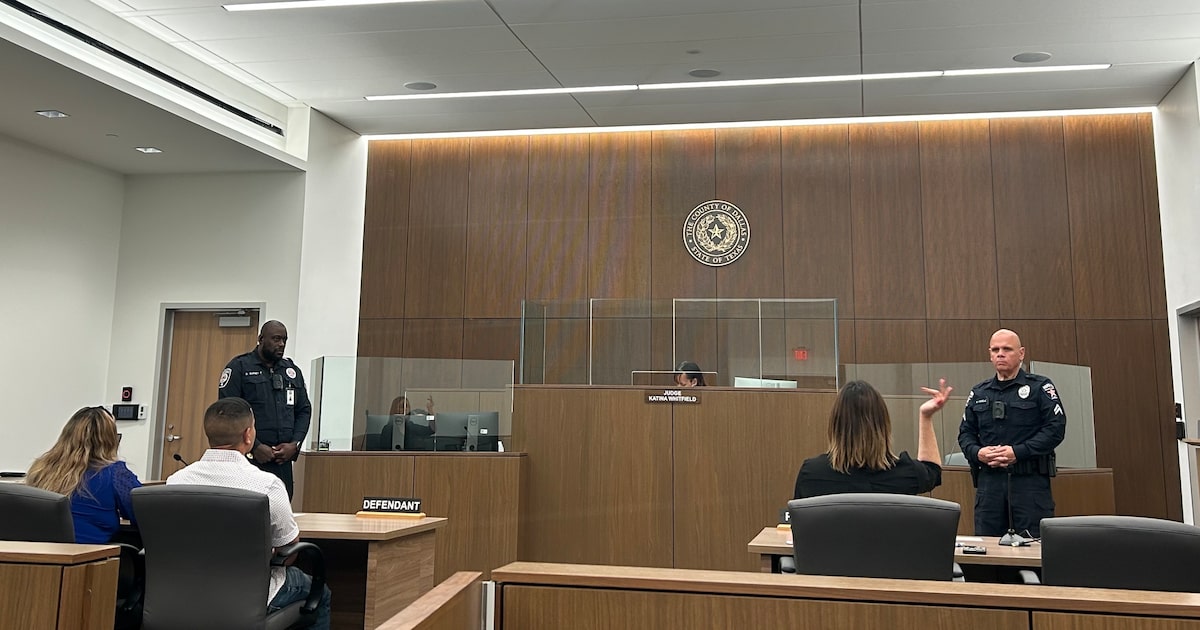In a justice of the peace courtroom in Mesquite on Tuesday, a deputy constable stood ready to perform his usual bailiff duties before a 1 p.m hearing.
But Dallas County Commissioner John Wiley Price made other arrangements: He directed a peace officer commissioned under the fire marshal to bailiff Judge Katina Whitfield’s courtroom instead.
The attempted replacement came after Whitfield emailed Price a list of grievances about her constable’s communication.
Price’s response resulted in a deputy constable and a fire marshal peace officer simultaneously overseeing the courtroom, even though constables are mandated by law to bailiff justice of the peace courts.
Political Points
The Aug. 5 incident was not only an example of Price’s intervention in a dispute between two other elected officials, it also highlights the continued manner in which the Commissioners Court deploys fire marshal employees for non-fire or arson duties despite admonishments from state officials.
“There are no ifs, ands or buts about it: one of (constables’) sole functions is to bailiff and oversee the courts,” said Jason Johnson, a constable in Kaufman County who teaches courtroom security courses throughout Texas. “Now you’re interfering with a constable’s jobs, duties and responsibilities.”
‘Overreaches his power’
On Aug. 1, a deputy constable was 20 minutes late to a hearing, due to what Constable Deanna Hammond attributed to confusion over the judge’s calendar. Whitfield confirmed this was the first time such tardiness occurred. But the incident prompted her to email Price three days later with a list of concerns about Hammond’s communication – which resulted in his deployment of the fire marshal to bailiff.
“Commissioner Price took it upon himself to make this change,” Whitfield said. “I called him … he said ‘I made the decision.’ ”
When reached by phone, Price declined to answer any questions about his use of the fire marshal’s office before hanging up on a reporter. But County Judge Clay Lewis Jenkins confirmed that bailiff duties are the statutory role of the constable and said the marshal had been removed from the courtroom Thursday.

Dallas County Commissioner John Wiley Price of District 3 delivered his remarks during the Dallas County Commissioner Court meeting in Dallas on Feb. 4, 2020.
Tom Fox / Staff Photographer
Jenkins declined to answer whether a commissioner had the authority to direct the fire marshal’s office to take such action, or if that power was supposed to lie with the county judge.
With 40 years in his seat, Price has become a larger-than-life influence in Dallas County politics.
“He overreaches his power of authority,” Hammond said of Price. “He interferes with my office as an elected official and his conduct is more personal than professional.”
Under state investigation
Roughly a decade ago, the Commissioners Court began deploying peace officers commissioned under the fire marshal to conduct security at county buildings and guard public meetings. They called their new agency the Dallas County Marshal Service, the only such department in Texas.
But there is no such thing as a “county marshal” authorized in state statute, according to the Texas Commission on Law Enforcement. In February, TCOLE executive director Greg Stevens told Dallas County he was concerned the Fire Marshal’s office was acting outside its authority.
During the regular legislative session, state lawmakers admonished Dallas County’s use of fire marshal peace officers for security, calling it an improper “quasi-police force.” They passed a bill that clarifies the roles of a fire marshal as fire and arson related and prevents counties from creating law enforcement agencies that don’t exist. Gov. Greg Abbott signed the measure into law, which takes effect Sept. 1.
In response, Dallas County Administrator Darryl Martin confirmed he is phasing out the name Dallas County Marshal Service. But he said the county will continue using peace officers commissioned under the fire marshal for building security because the law still doesn’t explicitly prohibit it.
Asked about Price’s deployment of a fire marshal peace officer to serve as a court bailiff, Gretchen Grisby, director of government relations for TCOLE, said “it does not sound like a situation that would fall under TCOLE’s statute or rules to look into.”
But Grisby said TCOLE has an active investigation into the Dallas County Fire Marshal’s Office. She did not respond to questions about the nature and scope of the probe.

Dallas County Marshals at the Dallas County Commissioners Court in Dallas on April 1.
Anja Schlein / Special Contributor
‘I won’t be intimidated’
In her email to Price, Whitfield, the judge, listed a series of complaints about Hammond. For one, she had the same deputy constable bailiff for about two years until mid-July when Hammond reassigned him without notifying her.
“How am I supposed to trust that we’re secure if you won’t even communicate with me?” Whitfield said.
Hammond said the deputy asked to move to another location and she had no obligation to alert the judge ahead of time.
The constable said she immediately assigned a new bailiff to Whitfield’s court without interruption of service.
“She tries to run my office and she can’t,” Hammond said.
Then the incident with the tardy bailiff occurred. Whitfield texted Hammond at 10:19 a.m. on Aug. 1 stating no bailiff was present for a 10 a.m. hearing.
Hammond said she did not assign one because the hearing was marked “pending” on the calendar. Whitfield said that word referred to the number of potential cases on the docket, not whether a hearing would happen.
Whitfield confirmed Hammond immediately sent a chief constable to the second floor to bailiff the court after that text.
The incident prompted Whitfield to draft an email to Hammond listing concerns about communication over the past two years, mostly unrelated to the bailiffs. She first sent the email to Price for his feedback.
Price responded by copying Fire Marshal Robert De Los Santos and requesting “that a marshal be appointed” due to Hammond being “derelict in her duty.”
While justice of the peace bailiff duties lies with the constables under state law, Whitfield said legislation passed in 2017 in response to the attempted assassination of Travis County district Judge Julie Kocurek gives any commissioned peace officer authority to provide security to judges.
For Hammond, she said this is an overstepping of authority by Price and a misuse of the fire marshal office. She said she doesn’t have a friendship with Price like Whitfield, so the commissioner never reached out to get her perspective on the situation. If he had, Price would have known there was no pattern of her court being left without a bailiff, Hammond said.
“I do my job, I’m out here serving my community,” Hammond said. “…I won’t be intimidated.”
‘Misuse of funds’
In Dallas County justice of the peace courts, fire marshal employees perform building security and operate the metal detectors while constables provide bailiffs and courtroom security.
In other counties, justice of the peace building security is done by constables, said Johnson, the Kaufman County constable and statewide safety instructor.
On Tuesday, the deputy constable took the lead in overseeing the courtroom and shuffling documents and evidence between Whitfield, plaintiffs and defendants while the fire marshal peace officer stood by. Three other fire marshal employees were present observing proceedings.
“I’m looking at this as a misuse of funds,” Johnson said of the overstaffing. “County commissioners do not control our office. They cannot tell us what they can and can’t do. All the commissioners can do is set the budget for the sheriff and the constables to operate on.”
In February, during a discussion about staffing and courtroom security, a Commissioners Court committee discussed the idea of transferring bailiff duties to fire marshal peace officers. The idea was quickly tabled.
During the meeting, Price acknowledged it wasn’t possible to reassign the role because constables have “two duties in statute. Two. Bailiff the court and serve process – period.”
